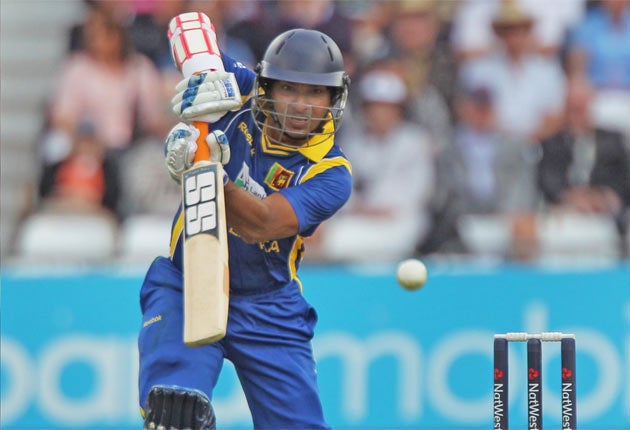James Lawton: Sangakkara's innings was brave – his Long Room speech more so
He played cricket because of his passion for the game and his knowledge of how important it was to the morale of the people

On a day when some of the biggest names and most lustrous egos in English cricket were required to refurbish hard-won reputations, there was some considerable success when the rain clouds above Trent Bridge finally scudded away.
This was especially so in the embattled case of Stuart Broad, the fully paid-up Ashes hero whose competitive instincts have once again been running sharply ahead of mature judgment, particularly in the light of his promotion to the captaincy of the England Twenty20 team.
His vehement verbal onslaught against umpire Billy Bowden the other day cost him half his match fee and brought fresh fears that when the pressure mounts without much accompanying success, he is an explosive indiscretion waiting to happen. As England struck back at Sri Lanka yesterday, though, he took two wickets and bathed in the acclaim of the home crowd, which included a young woman carry a large banner declaring "I love Broady". Most people do when he is bowling or batting with bold flair and the dashing good looks of a young hero from the pages of F. Scott Fitzgerald. But if Broad did much to re-instate himself in the public mind, and his team-mate Jimmy Anderson imposed much wreckage in a brilliant opening spell, there was pretty soon evidence that cricket's man of the week was far from likely to be a member of the winning team.
This was the time-honoured Sri Lankan veteran and former captain Kumar Sangakkara, who presented the only sustained resistance to a rampant English attack drawing full benefit from the winning call of captain Alastair Cook that gave them first use of the succulent green top.
Sangakkara's wicket was the last to fall after he scored 75 off 107 balls. Yet if this was distinguished work, befitting one of the most respected figures in the cricket world, it surely paled beside the impact of his performance in the Lord's Long Room less than 48 hours earlier. Then he was given a standing ovation for a speech filled with courage and a biting insight into some of the reasons why cricket is seen so often to betray itself.
The man who delivers the Cowdrey Lecture is not supposed to drench the austere old room with the provocative notion that the game's worst enemy lurks within and that in the case of his own war-fractured nation, for sure, it has fallen into the hands of opportunist power-seekers and political lickspittles. Sangakkara, in so many eloquent words, said that he had not spent a lifetime perfecting his cricket skills, and recently risked death at the hands of terrorists in the attack on the Sri Lankan team bus in Pakistan, to perform on behalf of such interests.
Sangakkara played cricket because of his passion for the game and for his understanding of how important it was to the morale of his people. It was more important than money and ego – and certainly it dwarfed, in his mind, any gaining of political influence. It meant that when he performed so steadfastly in what seemed certain to be a lost cause yesterday his work seemed to give off the kind of glow not normally associated with an admirable, if, in his terms, routine performance. The great Michael Holding, one of the men who rose to his feet in the Long Room, certainly felt the impact.
Earlier he revealed that when Sangakkara cut into the administrators of the Sri Lankan game, he put into the dock his own West Indian board. He said how the game in the islands, the pride of the people in it, had moved in reverse proportion with the arrival of the big money from TV and sponsors. A sport that been a great glory of the Caribbean had become riddled with division and envy and, sometimes, outrageous preferment in international selection. "Now," said Holding, "the West Indian team is deeply divided."
Meanwhile, England went about the job of rehabilitating their one-day reputations and drawing level in the current series. Cook sought to rebut the criticism of Mike Atherton that in terms of the ODI game he was an unsuitable opener and skipper. Jonathan Trott, for all his superb figures, might even have been considering a marginally brisker approach.
Broad, with the encouragement of his two wickets, also seemed to see the point of dispelling the suspicion that in his opinion a faulty decision or a dropped catch or unsatisfactory field placing might just be reasonable cause for the outbreak of the third world war.
No doubt England had some serious work to do out on the field and there was no doubt some reason to applaud the way that had tackled it. However, they might just understand that for some it was a rather pygmy-slight assignment when set against the nerve and the depth of the ambition of Kumar Sangakkara.
Join our commenting forum
Join thought-provoking conversations, follow other Independent readers and see their replies
Comments
Bookmark popover
Removed from bookmarks